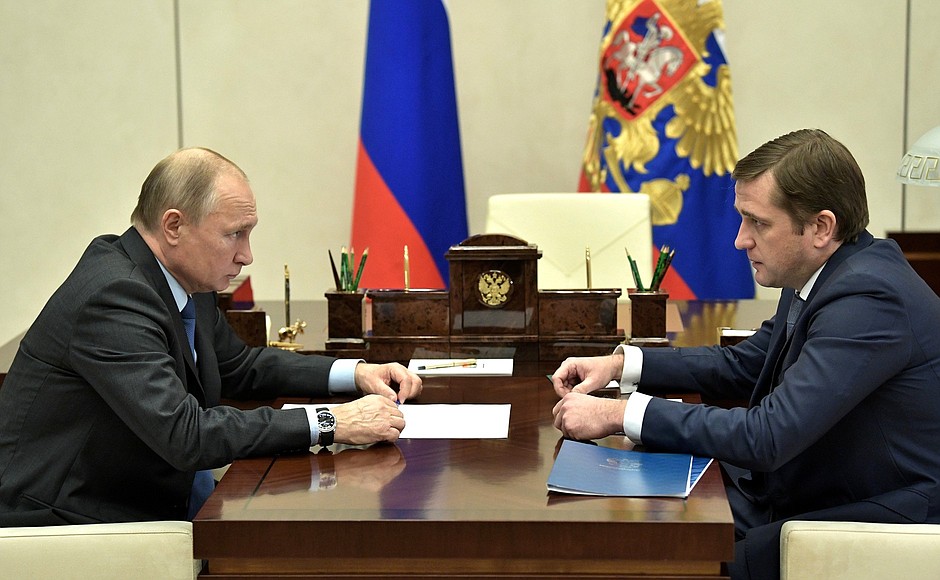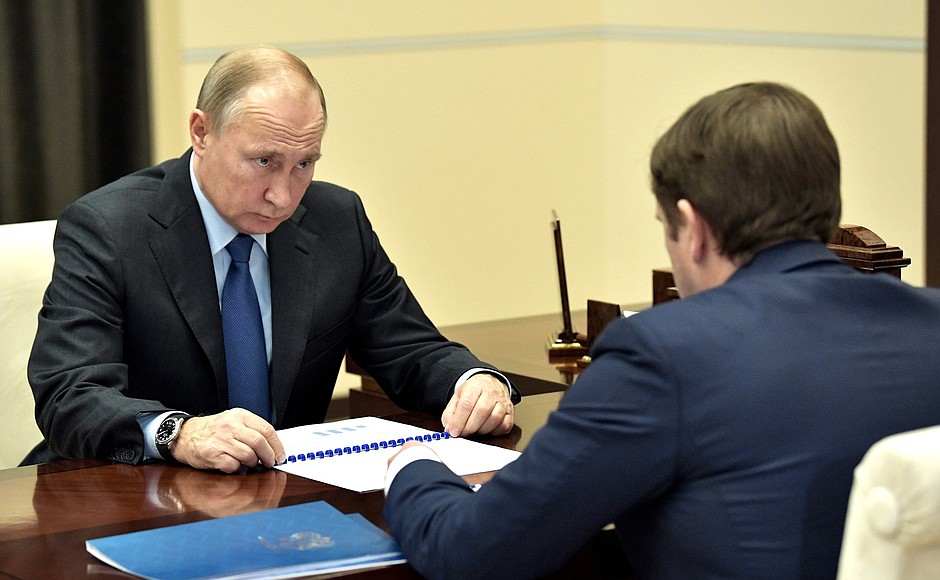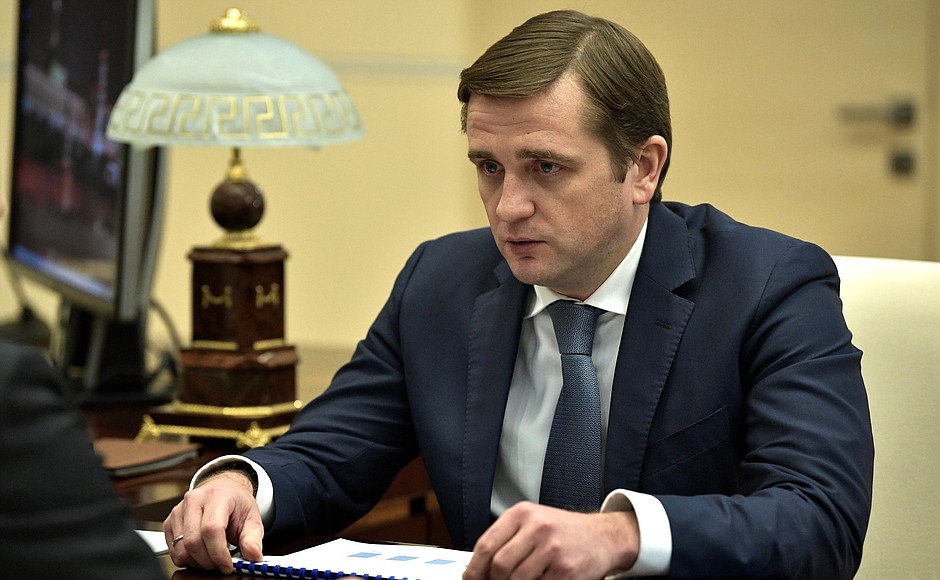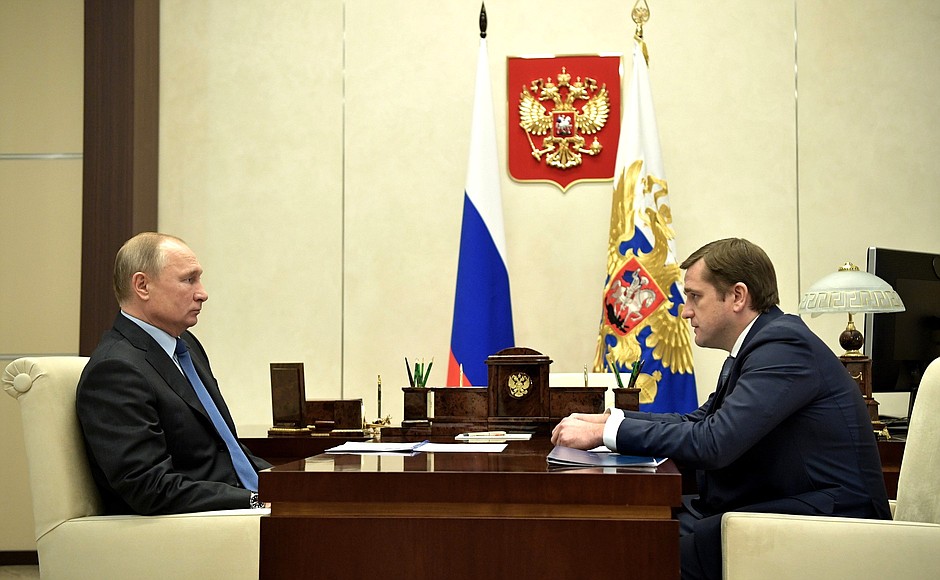Vladimir Putin: The year is coming to an end, and you wanted to report on the industry’s performance.
Ilya Shestakov: Mr President,
I would like to report on the preliminary results of 2018; in general, production has increased. This year it grew by almost six percent. I would like to remind you that it has been on the rise since 2014.
We are confident that this year we will cross the mark of five million tonnes. The last time we caught that much was in 1992.
In 1992, it was 5.6 million tonnes. We have not managed to reach that volume since then. But now the situation has changed due to the current support measures and regulations.
Of course, the main contribution was made by the 2018 salmon-fishing season.
Vladimir Putin: It was an unusual one.
Ilya Shestakov: Very unusual, we caught 676,000 tonnes of salmon. This is an all-time record.
Vladimir Putin: So where is the red caviar?
Ilya Shestakov: As for red caviar, most of it comes from humpback salmon; it will be sold on the domestic market.
This is a socially important species of fish; and the prices have already gone down: the wholesale price dropped by half, the retail price decreased a bit less. It became possible due to such a record-breaking fish ‘harvest’.
We caught more humpback salmon than any other fish. The main region for salmon fishing is Kamchatka. All this, of course, was possible due to the professionalism of fishery experts and the regulatory measures that were adopted.
This, of course, includes the work of fishery protection units, the border guards and the Interior Ministry. This year and in past years as well, we managed to successfully prevent poaching. Humpback salmon is also fast to return to the rivers after spawning.
Vladimir Putin: How often do you have such successful fishing seasons?
Ilya Shestakov: This one was an all-time record. We would like to check, but we have not had such seasons in general.
In fact, it presented us with certain challenges because we ran out of refrigerating capacity and vessels to transport fish to Vladivostok.
The Minister has issued instructions to review support measures in the agricultural development programme to build additional refrigerating infrastructure in Kamchatka and Sakhalin.
Vladimir Putin: Do you reach the European part of the country?
Ilya Shestakov: Yes, of course, but we lack capacity there during the fishing season.
As you know, plans call for another logistics project on the Nazimov Cape, and it is promising in terms of organising a fish exchange there.
The thing is that the most popular fish products are traded at Asian auctions, and we want to transfer it to Russian jurisdiction and compel the companies to trade part of their produce at the Russian auction platform. But in order to do so we need to create the relevant infrastructure.
As for economic data, in the first nine months of 2018 we received 34 billion rubles in taxes, which is ten percent more than last year. Therefore, we are growing in terms of our contribution to the GDP and tax payments.
Aquafarming also grew by six percent in the nine months of 2018.
This is due to the new law on the aquaculture, and we also increased the number of facilities used to breed fish for sale.
That is, we gave 500,000 hectares to entrepreneurs so they could farm fish. Mariculture is also developing rapidly, especially in Primorye Territory and Crimea.
We have high expectations there too: the production volume might be not too high, but given its value, it will make a significant contribution to the sector.
Vladimir Putin: Why? What special value does it have?
Ilya Shestakov: I mean that the price and cost of this production – sea cucumbers, oysters and scallops, for instance – is high and they are popular on Asian markets and in Primorye cities. Of course, this is more valuable produce and it costs more.
Vladimir Putin: And in Crimea?
Ilya Shestakov: In Crimea, we have oysters and mussels. This sector is developing rapidly and there are many companies that are engaged in this kind of production. There are certain difficulties related to providing water bodies and land plots for use, but in all, the development is rapid.
Vladimir Putin: What are the land plots for?
Ilya Shestakov: The land plots are needed to create a production base…
Vladimir Putin: Fodder?
Ilya Shestakov: Yes, the production base is needed for loading and processing.
I would also like to tell you about the investment programme. We are planning to launch six ships as early as 2019. All in all –we have already signed a contract – 33 fishing boats and 22 coastal factories will be built.
The total volume of investment committed is 132 billion rubles. Not all the investment quotas have been distributed yet. We will complete this programme in 2019, but two vessels have already been launched.
Mr Putin, I would like to take this opportunity to invite you, on behalf of the fishing community, to the launch of the next fishing vessel because that would be a major event for the fishermen.
Vladimir Putin: Where is this vessel being built?
Ilya Shestakov: Mostly in St Petersburg, and there is a facility in Kaliningrad. The next vessel will be launched in St Petersburg in March.
Vladimir Putin: Will it be big?
Ilya Shestakov: 85 metres long. These are big vessels that can handle the full processing cycle. We deliver processed products. There will be a processing factory and waste-free production, that is, the product will be either fishmeal or fish oil, so it is a totally new class of vessel no other fishing country has.
Mr Putin, I would like to tell you about our plans for 2019–2020. The Federal Agency for Fishery has been instructed to organise a round-the-world expedition of instructional sailing vessels dedicated to the 200th anniversary of the discovery of the Antarctic and the anniversary of Victory in the Great Patriotic War.
We are planning for our two vessels to sail round the world and meet off the Antarctic coast. It will be a momentous occasion because very serious events are planned as part of our calls at foreign ports.
And of course we think that the work our instructional sailing vessels are doing will change how our country is perceived as a fishing power in the international arena.
Finally, Mr Putin, I would like to say that following your instructions we will shoot scientific research footage in the Antarctic in 2019–2020. No such research filming has been done since 2002. We are starting on it together with the Russian Academy of Sciences next year.
Vladimir Putin: How are the crews of the sailing ships formed?
Ilya Shestakov: They are mainly trainees at institutions under our jurisdiction. We also invite foreign students who apply, and they take part in these expeditions.
Vladimir Putin: Will the crews be rotated as the expedition proceeds?
Ilya Shestakov: Yes, they will be rotated. Two rotations are planned and they will take place at our ports of call
<…>



